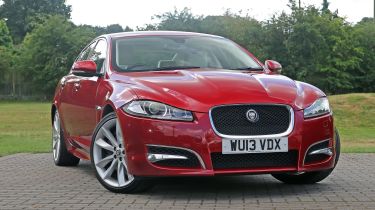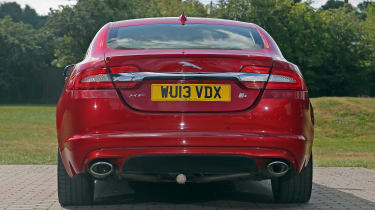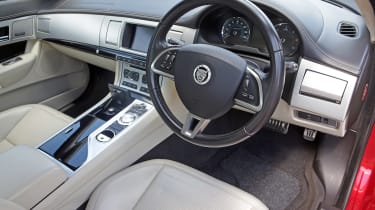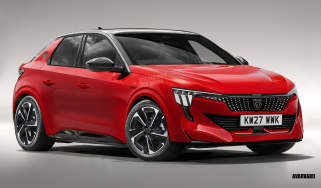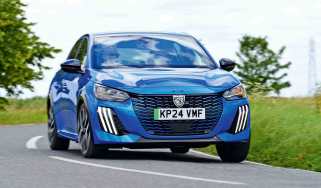Used Jaguar XF Mk1 review
A full used buyer’s guide to the Jaguar XF covering the XF Mk1 (2008-2015)
When it was in production the Mk1 XF racked up one award after another. It was our 2008 Car of the Year and was voted by you as the Car of the Decade in 2011. Having scooped first place in our 2009 Driver Power survey, it had five top five places in a row. This year it was third in our used car satisfaction poll. It would be easy to think that because the XF isn’t German it isn’t an exec class contender; these results prove it is more than just a mere contender.
The arrival of the XF marked the start of a new era for Jaguar. Until this stylish four-door saloon with its coupe-like profile was launched, the big cat’s design language didn’t seem to have moved on from the company’s heyday in the sixties.
Then, suddenly, here was a car that didn’t look anything like a Jag – and it was all the better for it. The XF wasn’t just a pretty face, though, because under the skin was a class-leading set of mechanicals that ensured the model was brilliant to drive.
It was just as good inside, with the cabin beautifully built, modern and spacious. No wonder the XF has won group tests, reader satisfaction surveys and awards galore.
History
The XF saloon replaced Jaguar’s S-Type in April 2008, with 3.0 V6 or 4.2 V8 petrol engines, or a 2.7 V6 diesel; the V8 also came in 410bhp supercharged SV8 form.
Used - available now

2023 BMW
5 Series
32,863 milesAutomaticDiesel2.0L
Cash £26,697
2023 Land Rover
Range Rover Evoque
33,675 milesAutomaticPetrol1.5L
Cash £26,197
2023 Volkswagen
Tiguan
41,025 milesAutomaticPetrol1.5L
Cash £22,097
2022 Peugeot
5008
30,467 milesManualDiesel1.5L
Cash £20,397A refresh in March 2009 saw a 5.0-litre V8 replace the 4.2-litre unit, while the SV8 became the XFR and the 2.7 V6 diesel was replaced by a 237bhp 3.0-litre unit.
A year later, a high-power (271bhp) 3.0-litre diesel engine arrived in the XF S. The XF got a big facelift in September 2011, plus its first four-cylinder engine, the 188bhp 2.2D.
The XF Sportbrake estate was launched in 2011, along with a 161bhp version of the 2.2D engine. The naturally aspirated V8 was replaced by a supercharged 3.0-litre V6. A new Mk2 XF arrived in 2015.
Which one should I buy?
All of the XF engines are excellent, with the 2.2D capable of providing swift, smooth progress that concentrates on economy.
The V8s are fabulous to drive, but costly to run because they focus on performance. The V6 diesels are the best compromise of performance and economy, and the 3.0D is particularly impressive.
Luxury trim has touchscreen multimedia, eight-way electrically adjustable seats, sat-nav, 17-inch alloys, leather trim, climate and cruise control and rear parking sensors. Premium Luxury adds a premium sound system, 10-way seat adjustment, 18-inch wheels and a heated windscreen.
Portfolio models feature heated and cooled seats, a 1,200-watt sound system, auto-dimming mirror and 19-inch alloy wheels. A DAB radio and adaptive cruise control were options on all models.
Alternatives to the Jaguar XF Mk1
The German trio of Audi (A6), BMW (5 Series) and Mercedes (E-Class) is the Jag’s nemesis. All well established by the time the XF arrived, these have been available for years in saloon or estate forms, with excellent engines and transmissions.
They are superbly built, refined, safe and well equipped, as well as spacious, costly to buy and extremely desirable. Less obvious choices are the Lexus GS and Volkswagen Phaeton, which are both available only as saloons. The hybrid-only Lexus is incredibly refined, comfortable, well equipped and top value; the VW is roomy and good value but it’s now rather dated. Also consider the Skoda Superb; although the badge isn’t as prestigious, the car lives up to its name.
What to look for
TPMS
The tyre pressure monitoring system can fail when the valve-mounted sensors corrode and stop working. Check each wheel individually before purchasing.
Brakes
Rear brake pads tend to wear quickly, and if they’re not replaced in time it will lead to the discs being damaged. Replacing those will increase the repair costs significantly.
Sensor
On 3.0-litre diesel cars, the particulate filter sensor can fail. This will lead to the car resorting to limp mode. However, only the filter sensor will need replacing.
Fuel cap
Fuel filler grommet can come undone on early models, which makes the filler neck become a bit loose and the car difficult to refuel. Jaguar redesigned the grommet for later cars.
Interior
Modern and full of neat design features that set it apart, the XF’s cabin is superb. The touchscreen multimedia system is dated and while front seat space is good, rear headroom is tight because of the sloping roofline. Boot space is 500 litres, more than its key rivals; Sportbrake can stow 1,675 litres.
Running costs
All XFs need maintenance every 12 months or 16,000 miles. Services alternate between minor and major, which for the diesels cost around £285 and £440 and £325 and £410 for a supercharged V8 XF.
Brake fluid needs replacing every three years (at £58) and the coolant every 12 years (at £200). Petrol engines are chain-driven, while the diesels have a cambelt that has to be replaced every seven years or 112,000 miles, at a cost of £762. This price also includes a service.
The big service for a supercharged V8 is six years or 96,000 miles. Expect a £1,000 bill because it’s the point at which the supercharger belt has to be renewed.
Recalls
Although the XF has been the subject of 19 recalls so far, owners still rate the Jaguar as excellent for reliability.
The first came five months after the XF went on sale due to faulty rear seatbelts. Instrument cluster failures led to another in December 2008, while other recalls have been for possible fuel starvation, power-steering leaks, fuel leaks, electrical short circuits, brake pipes chafing, airbags not working properly, suspension failures and engine problems, generally caused by some sort of fuelling issue.
Driver Power owner satisfaction
Third place in our Driver Power 2017 used car survey is great. It was second for ride and handling plus build quality and reliability, fourth for comfort and seventh for practicality. Its worst score was 37th for running costs.

